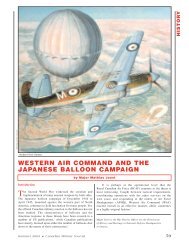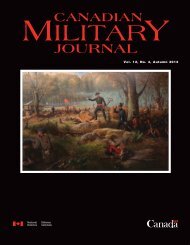MILITARY
CA JOURNAL - Revue militaire canadienne
CA JOURNAL - Revue militaire canadienne
- No tags were found...
Create successful ePaper yourself
Turn your PDF publications into a flip-book with our unique Google optimized e-Paper software.
VIEWS AND OPINIONS<br />
Credit: RMCSJ photo cmr-rmc-18<br />
Cadets in class<br />
our faculty – civilian and military – are necessarily ineffective.<br />
Indeed, many are admirable instructors; rather, it is that little<br />
serious attention has been paid to the quality of teaching (and its<br />
effect upon student learning) that is conducted.<br />
To be more specific, while teacher training certification<br />
programs (that, to be fair, certainly range in quality) have sprung<br />
up at a number of post-secondary civilian academic institutions,<br />
professors at RMCC typically look to Queen’s University for<br />
opportunities for such professional development. While universities<br />
across the Western world have established centres for teaching<br />
and learning excellence across their campuses – through which<br />
experts in pedagogy and academic technology support faculty<br />
members interested in improving their ability to promote deep<br />
learning among their students – RMCC has done no such thing.<br />
There is no requirement to learn how to teach, or, for that matter,<br />
to study anything related to student learning while pursuing a<br />
PhD in War Studies, nor do the military teaching faculty at the<br />
Canadian Forces College undergo anything more than a cursory<br />
introduction to teaching and learning in advance of their taking<br />
up full-time roles in the post-graduate-level classroom. 1<br />
In RMCC’s, and DND’s defence, war colleges and similar<br />
military educational institutes around the world are not, collectively,<br />
any better. To the best of my knowledge, no Canadian allies<br />
have formalized a rigorous program to ensure that professional<br />
military education in their country is delivered by qualified,<br />
certified, post-secondary military educators. And that is why the<br />
Department of National Defence, and the CAF in particular, is<br />
faced with a tremendous opportunity. For what would be a relatively<br />
minimal cost, DND could transform Canada into the centre<br />
for teaching excellence in professional military education.<br />
How could this be done? I see three specific areas that would<br />
require investment and/or change: (1) intellectual infrastructure;<br />
(2) hiring and promotion processes; and (3) branding.<br />
First, the CAF, through the Canadian Defence Academy,<br />
might consider creating the first-ever internationally accredited<br />
(by the globally recognized Staff and Educational Development<br />
Association) post-secondary professional military education<br />
teaching certification program. Such a program could be housed<br />
in a new centre for teaching and learning located, at least provisionally,<br />
at RMCC. Such a certification program could be offered<br />
(either through travelling instructors or through the distance<br />
learning format) to academic and military instructors in war colleges<br />
around the world.<br />
Second, as is becoming standard practice at leading civilian<br />
universities, RMCC could require all faculty to submit teaching<br />
dossiers as part of their applications for positions and promotions.<br />
Doing so will require hiring boards at RMCC to learn how to<br />
evaluate such dossiers, which will make the establishment of a<br />
centre for teaching and learning all the more important). The<br />
46 Canadian Military Journal • Vol. 13, No. 4, Autumn 2013





